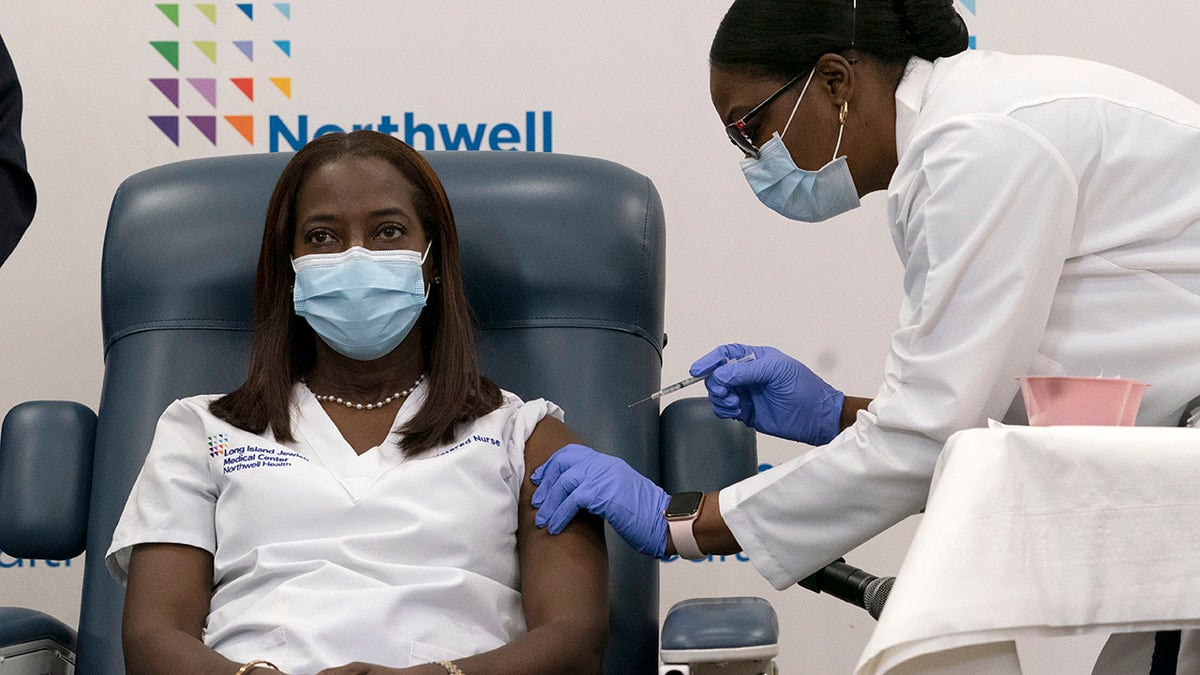US faces challenges in coronavirus vaccine rollout
Some health workers refuse to take the coronavirus vaccine; reaction and analysis from Fox News medical contributor Dr. Marc Siegel on ‘America’s News HQ.’
The New York nurse who became the first in the U.S. to receive a dose of the Pfizer and BioNTech coronavirus vaccine last month received her second shot on Monday, becoming one of the first in the country to be fully inoculated.
"My message is going to be, just looking at me as an example that the vaccine is safe," Sandra Lindsay, a nurse at Long Island Jewish Medical Center, said, according to the New York Post. "I haven’t had any side effects."
Lindsay’s second dose comes three weeks after her first, which is the requirement for the vaccine’s two-jab schedule. It came on the day that New York Gov. Andrew Cuomo announced that hospitals who were not moving quickly enough through their supply of the vaccines could soon face fines of up to $100,000.
DAILY CORONAVIRUS CASES IN CALIFORNIA SURGE PAST 45,000
Cuomo said the threat to fine hospital systems that are sitting on supply is meant to accelerate the vaccination process. The U.S. fell far short of a goal set by Trump administration officials to vaccinate 20 million people in by the end of 2020.

Sandra Lindsay, pictured above getting her first shot on Dec. 14, said she wants others to be informed about the vaccines rather than relying on hearsay. (AP Photo/Mark Lennihan, Pool)
As of Monday, the U.S. had distributed more than 15.4 million doses of the COVID-19 vaccines, but only given out 4.5 million to Americans. Shipping delays, bungled technology and administrative missteps have contributed to the delays.
Frontline health care workers and residents of long-term health care facilities were among the first to receive the vaccine, with several areas of the country already moving into later phases that include elderly populations.
SOUTH AFRICAN CORONAVIRUS VARIANT 'VERY SIGNIFICANT PROBLEM' UK HEALTH MINISTER SAYS
There have been instances of adverse reactions to both the Pfizer vaccine and Moderna shots, some of which required hospitalizations. At least six such instances are under investigation by the Centers for Disease Control and Prevention (CDC).
The agency has since stated that anyone who has a history of severe allergic reaction to MRNA COVID-19 vaccines or an immediate reaction to polysorbate should not receive the vaccine at this time. Those who have had an allergic reaction to other vaccines or injectable therapies should be counseled "about the unknown risks of developing a severe allergic reaction and balance these risks against the benefits of vaccination."
Officials have also been working to combat vaccine hesitancy, urging those who are opting out to consult a health care provider rather than Internet forums.
CLICK HERE FOR COMPLETE CORONAVIRUS COVERAGE
Lindsay echoed those efforts after receiving her second shot on Monday.
"I just want to tell people that if you’re uninformed, get informed," she said, according to The New York Post. "Don’t listen to hearsay. Let us all do our part. It’s our civil responsibility in a crisis to just band together and get through this. COVID-19 has stripped us of our lives and our livelihoods – and 2021 is our opportunity to reclaim that."








































